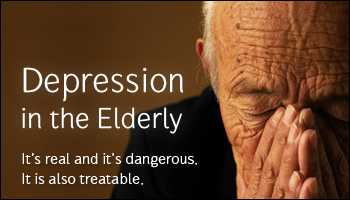Getting old doesn’t mean you should be depressed.
In my previous post Old and Depressed: The Not So Golden Years, I mentioned five causes of elderly depression. Sadly though, many old people suffer with depression. Grief, leaving home for a nursing home, adult kids who don’t seem to care, complications with health related issues. These are cause of elderly depression. Treating depression in the elderly isn’t always done in time, and sometimes there is no treatment at all because depression is missed.
I’ve witnessed my 70+ old uncle become depressed after having to leave his home. Then becoming depressed when his girlfriend died. Fortunately, he had a good advocate in me and great doctors, so the depression was caught in time.
Six suggestions for treating depression in the elderly.
1. Get a good geriatric doctor.
Geriatric doctors are trained to deal with illnesses specific to older people. A geriatric doctor has many diagnostic tools such as the Geriatric Depression Scale to identify depression from normal stages of aging. These doctors are trained to deal with chronic pain and dementia. Unfortunately finding a geriatric doctor who accepts new patients can be tough. There’s few of these specialized doctors at a time when most of the US population is hitting old age.
2. Keep physically fit.
You don’t need to be a super athlete. Heck, if all you can do is stretch and walk around, you are active. Congrats! Physical exercise – moving your body – decreases depression because of endorphins released into the bloodstream. It also keeps muscles toned and fit. Exercise doesn’t have to be strenuous at this age. It can range from simple stretching while sitting on a chair, bowling, taking gentle walks or swimming. Staying active can be prevented by disease or permanent disabilities. Understand that active in an older person means gentle movement. Don’t place high expectations on anyone.
3. Keep an eye on how medications react with the senior.
Ironically, medications to treat chronic illness can cause depression. Antidepressants which work well in adults, will take longer to achieve the same results in someone who is over 60. Older adults might not see any changes for 6 to 8 weeks. Remember, medication works differently on everyone and there can be side effects. Monitor antidepressant dosage and make sure it isn’t causing side effects like paranoia, anxiety or other unwanted effects.
4. Psychotherapy.
Psychotherapy isn’t just for the young crowd. Psychotherapy works just as well for an elderly person. That’s because psychotherapy deals with mental health. Psychotherapy helps an older person deal with issues like grief and the loss of independence, increasingly poorer health, and loss of home. Older adult psychotherapy has to respect personal limitations of health such as poor eyesight and hearing, physical discomfort and any physical illness. It also looks at whether the mood is part of the disease or formed alongside of the illness.
5. Keep your mind sharp!
Social activities keeps a person young at heart! You enjoy life more when you’re with people you can connect with through shared life experiences. Hanging out in the food court with friends, walking in the mall, playing bingo or bridge – such activities fight isolation and depression. Even doing crosswords or playing computer games stimulates parts of the brain that make you feel good. There are new apps for keeping your mind sharp. These apps actually improve mental sharpness and create new neural connections. Some researchers claim certain apps help reduce dementia and the onset of Alzheimers.
6. Change what you do.
If you can change your bad habits into good ones, try it. Reducing high blood pressure and cholesterol not only makes you feel better, it also cuts down the number of medications you need to take. Eat properly and on schedule. Cut down or stop smoking. This one can be really difficult, as I know from my uncle. He’s tried quitting lots of times but can’t. Part of it is cigarettes make him feel good. Instead of being refused cigarettes, he’s allowed to smoke. As a caregiver you have to realize that what you consider a ‘bad’ lifestyle choice might be the only thing still bringing joy to your loved one.
Follow Terezia Farkas on Twitter:


